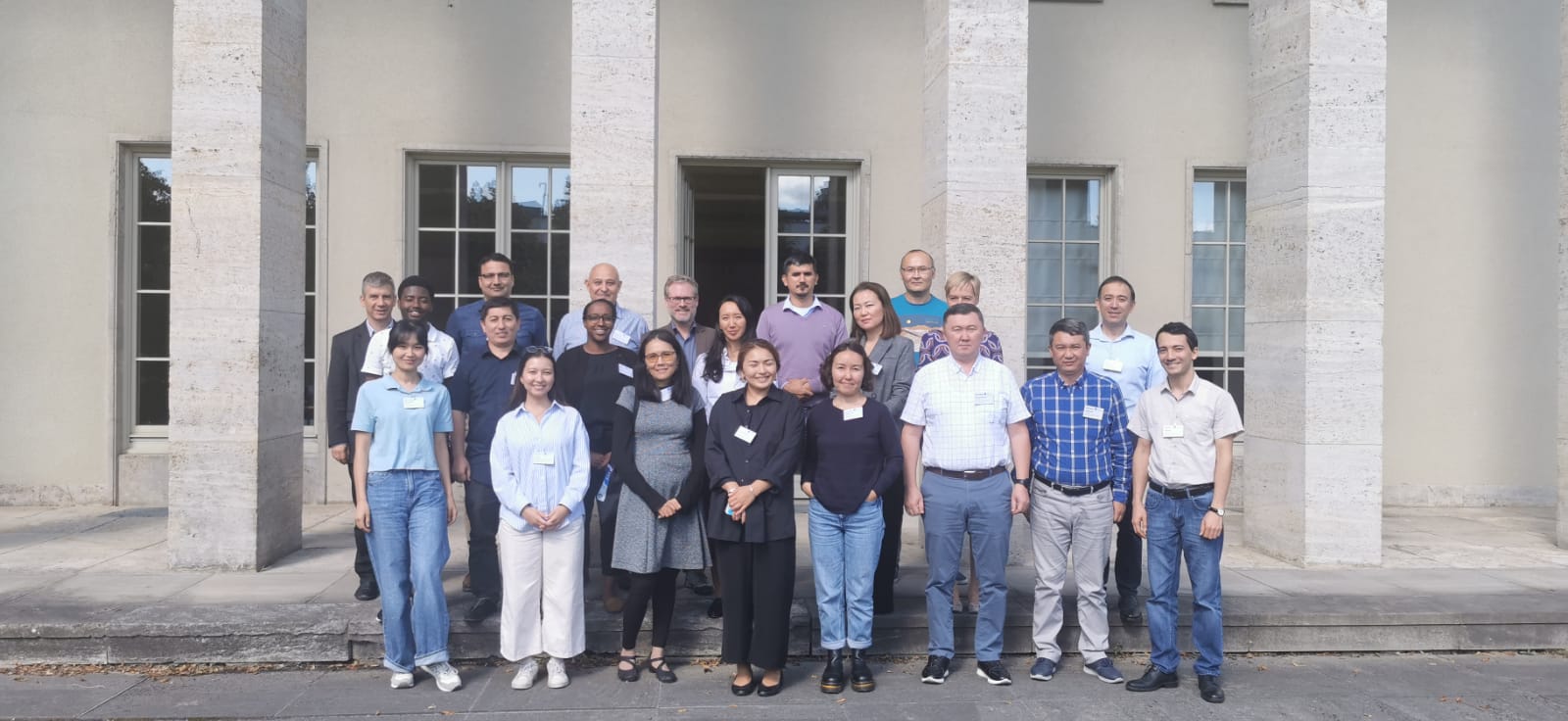Germany – Halle (Saale) – 14-14 September, the Program Specialist of Water Initiative Support Program of the Regional Environmental Centre for Central Asia (CAREC) Irina Yugay participated in the research workshop organized by the Leibniz Institute of Agricultural Development in Transition Economies (IAMO).
First-person: Irina Yugay on the current status of research on climate, water and migration in Central Asia

Participants of the CAWAMNET workshop © IAMO
The two-day workshop, held as part of the DAAD-funded project CAWAMNET - Central Asian Water Conflict and Migration Network, targeted 23 scientists from Central Asia, Germany, and Europe. The Regional Environmental Center for Central Asia (CAREC) was invited as a partner organization within the CAWAMNET project. During the two days, the diverse cross-disciplinary group of participants discussed the current state of research and research gaps on the linkages between climate change, water scarcity, water conflicts, and migration in Central Asia.
Based on the policy messages derived from the stakeholder workshop that took place on April 27-28, 2023, in Tashkent, the present workshop participants compiled an overview of empirical evidence, as well as research and action needs for a more comprehensive scientific dialogue on how to shift away from water use conflicts towards water use cooperation, taking into account the role of migration in this process. The scientific exchange covered new datasets, advanced methodology, and research approaches on the climate-water-migration nexus.
The workshop included an overview talk, three thematic sessions, and two group discussions. Through the interactive workshop setup, the participants continued the identification of interconnecting currently clustered topics into a nexus approach.
The first day started with an overview of regional climate change and land degradation and their impact on the economy of Central Asian countries, presented by Dr. Mirzabayev of the International Rice Research Institute. According to the latest IPCC report (2022), the region has experienced significant temperature increases, leading to more heatwaves and droughts. These extreme weather events are expected to intensify in the future. Precipitation changes coupled with human drivers will play a role in causing desertification. Possible solutions for response can be found in environmentally sustainable land management practices supported through governmental programs and various market instruments.
The follow-up presentation by Dr. Abdullayev of Giessen University included an illustration of the impact of water scarcity on real cases in Central Asia. According to the assessment, water scarcity for the last two decades led to a decline in agricultural productivity, with 20-30% crop losses and 10% land abandonment in lower Amu Darya and Syr Darya. It also caused a serious shortage of drinking water and energy problems in 2017-2019 and, hence, out-migration processes from the affected areas, particularly in Uzbekistan, South Kazakhstan, and Turkmenistan. By 2050, Central Asia could see as many as 2.4 million climate migrants (World Bank, 2022).
Despite the potential socio-economic consequences, including migration, there is a notable lack of in-depth research on these issues. Environmental migration in Central Asia remains understudied, creating a significant “blind spot” in social studies on climate change and human mobility. The pivotal research focus should be on:
1. Water scarcity core issues, consequences, and scales;
2. Interlinkages between economic and social differentiation affecting water scarcity in the region;
3. Coping strategies for climate change adaptation and mitigation.
Addressing these research gaps is crucial for understanding the broader impact of climate change on water resources and its socio-economic dynamics in the region, including migration and displacement.
Dr. Sultakeev of the American University of Central Asia stated that although Kyrgyzstan has high migration rates, related research is complicated due to the scarcity of systematically recorded data available on the actual number of labor migrants since national migration statistics are based on permanent resident documentation. He proposed an innovative research method combining geospatial and qualitative data processed by means of econometric calculations.
In her Ph.D. research, Ms. Blondy of the University of Neuchatel considers that while much research has been done to identify migrants’ strategies and their labor market situation in their country of origin considering climate-driven disasters from an adverse point of view, little attention has been devoted to their attachment and voluntary immobility, especially in quantitative studies. Her study seeks to address this gap, analyzing predictors of place attachment and belonging among remote mountainous societies in Tajikistan. It is important to consider ethnographical factors connected to time spent in a place; relational factors linked to people-environment, social networks, bonds, and contacts; cultural factors connected to feeling “at home”; different types of immobility primarily linked to environmental hazards colliding, making them unable to commute.
The second day started with presentations of the Ph.D. proposals on the climate-environment nexus in the Central Asian context, referring to new research frontiers and establishing a policy-relevant research agenda for the future.
The session was followed by two background-setting group discussions. The first one focused on climate change, human mobility, and the role of remittances in enhancing adaptive capacities, and the second one on water disputes and cooperation. The key point of discussion was devoted to subtopics related to climate-adaptive cooperation of smallholders in the region, factors of the local water disputes due to water scarcity, gender aspects and inclusive water management research, role of women in water conflict resolution in the context of labor migration.
The identified policy and research need for further developing a research agenda on the topic shall be summarized in a joint policy paper and scientific article. IAMO, in partnership with Westminster University in Tashkent, is planning to conduct the Regional Conference in Tashkent in April 2024, which will be the final event for the current phase of the CAWAMNET project.
For information about CAWAMNET:
https://www.iamo.de/en/research/projects/details/cawamnet-1/
Workshop presentations are available here.
Contact persons:
Dr. Nodir Djanibekov
Tel.: +49 345 2928-128
djanibekov(at)iamo.de
Dr. Kathleen Hermans
Tel.: +49 345 2928-142
khermans(at)iamo.de
